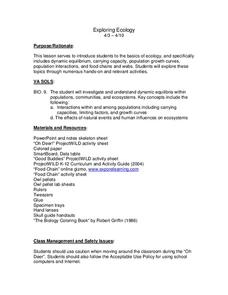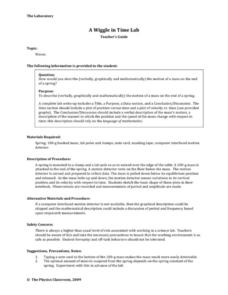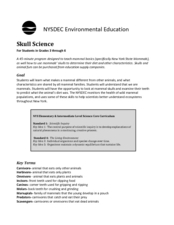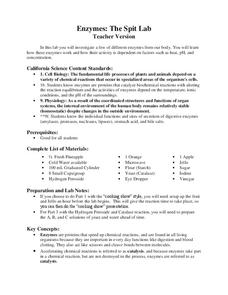Colorado State University
Why Can Warm Air "Hold" More Moisture than Cold Air?—Vapor Pressure Exercise
Does it feel a little humid in here? Learners assume the role of water vapor in the atmosphere as they explore the differences between warm and cold air. They roll dice to determine their level of energy, which determines if they stay...
Chemistry Collective
Virtual Lab: DNA Binding Problem
Why do the bases in DNA pair up the way they do? Unravel the mystery of the double helix in a virtual lab. Young scientists follow in the footsteps of Watson and Crick to determine the free energy associated with DNA base pair binding....
Curated OER
Examining the Fossil Record
Students create an evolutionary tree based on fossil morphology and their ages. In this fossil record lesson plan, students are given 23 pictures of fossil. They study their morphology and arrange the fossils by age and structures on a...
Curated OER
TE Lesson: Energy Transfer in Musical Instruments
Students study concepts of energy and energy transfer. They look at how these concepts apply to musical instruments. They study the law of conservation of energy. They use the concepts studied in the lesson to design a musical instrument.
Curated OER
Exploring Ecology
Students explore the basics of ecology through numerous hands-on and relevant activities. They participate in an online food chain demonstration, which explores food web dynamics. They dissect owl pellets, examine the prey's bones, and...
Curated OER
Beach Zonation
Students identify and separate the different zones of the beach by observation. They investigate beach zonation by gathering and comparing sand samples gathered from different areas of the beach.
Curated OER
Going...Going...
Students investigate equilibrium in erosion and deposition by predicting effects of moving water on soil; modeling an erosion simulation; observing results of a test; inferring causes and effects, and hypothesizing about erosion variables.
Curated OER
Energy Transfer in Musical Instruments
Students create unique sounds using different instruments. In this energy lesson, students read and define several vocabulary terms such as heat, energy transfer and thermal equilibrium. Students utilize several household objects to...
Curated OER
Laws of Motions
Seventh graders explore the Laws of Motion. They define friction and explain the concept of inertia. Students explain what happens when a force is exerted on an object that is in equilibrium. They state the second and third laws of motion.
Curated OER
Rocking the Boat
Students work together to discover the concepts of stability and equilibrium. They examine how equilibrium is related to an item's center of mass. They create their own action scene in a literacy activity.
Curated OER
Indoor Air Pollutant Sensing LAB: Peppermint Diffusion
Students engage in an experiment for the scientific concept of diffusion of particles. There are instructions for classroom set up prior to conduction of the activity. Students sit in the classroom that is filled with the smell of...
Curated OER
Virial Theorem Lesson
Ninth graders describe how equilibrium can occur as the balance of two effects. They model the stability of elliptical galaxies based on how fast stars within the galaxy are moving.
Curated OER
Ice Ain't Easy
Students are told that objects in contact with one another reach an equilibrium temperature. A hot object placed in a cool liquid always cool off. It never happens that the object gets hotter and cool liquid gets colder. Students predict...
Curated OER
Your Body: A Bacteria Incubator!
Students demonstrate their comprehension of PREDICTING AND HYPOTHESIZING by... ¿¿¿ Predicting a logical outcome to a situation, using prior knowledge, experience and/or evidence. AND ¿¿¿ Explaining reasons for that prediction. They...
Curated OER
Haber's Process- A Computer Simulation
Young scholars use an on line simulation to produce ammonia using Haber's process. In this Haber's process lesson plan, students use a spreadsheet to manipulate the pressure, temperature and catalysts used in the production of ammonia....
Physics Classroom
A Wiggle in Time Lab
Though an alternative method is suggested, the best way to carry out this investigation is with the use of a computer-interfaced motion detector. Physics fanatics hang a mass on the end of a spring and analyze its motion verbally,...
PHET
The Greenhouse Effect
How do greenhouse gases impact temperature? Have your classes use the interactive software to explore different concentrations of greenhouse gases and their effect on climate. Learners can recreate different atmospheric concentrations...
Curated OER
Ride the Rock Cycle
Students identify the steps in the rock cycle. They complete a K-W-L chart before the activity begins. They answer questions about the stages to complete the activity.
Curated OER
The Effects of Temperature on Rate
Students create predictions on what they believe happen to reaction rates when temperature is raised. They use hot, cold, and room temperature water for this experiment and observe the differences. They graph their observations and...
Curated OER
How do Hypotonic, Hypertonic, and Isotonic Solutions Affect the Water Movement of a Cell?
After removing the shell from a raw egg, cell biologists soak the egg in either a hypotonic, hypertonic, or isotonic corn syrup solution. They calculate the percent change in mass and compare it to the strength of the solution in a...
Curated OER
Reptiles and Amphibians
Introduce your class to various reptiles and amphibians. They will meet and identify a representative from each of the four major reptile families, then learn about and discuss reptile characteristics. Next, they will identify and...
Curated OER
Skull Science
What can your class learn from a skull? With proper facilitation, they can learn about diet, physical adaptations, special differences, and even the environment. Pupils will examine a series of mammal skulls and pelts to help them...
Curated OER
Pond Ecology
A lab activity is a great way to incite thoughtful questioning and scientific processes. Pupils will collect organisms with a Petri dish, make observations, sketch the organism, ask questions, then attempt to identify the specimen...
LABScI
Enzymes: The Spit Lab
Enzymes in our bodies each have a job to do. Learn the factors that affect the activity of some enzymes using the third activity of an informative 12-part biology series. A three-part laboratory activity asks teams to investigate how...
Other popular searches
- Dynamic Equilibrium
- Chemical Equilibrium
- Hardy Weinberg Equilibrium
- Thermal Equilibrium
- Market Equilibrium
- Punctuated Equilibrium
- Equilibrium Prices
- Genetic Equilibrium
- Equilibrium Constants
- Prue Calculus Equilibrium
- Equilibrium Quantities
- Price Equilibrium

























